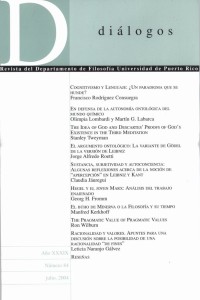Abstract
In this paper I argue that Rorty's pragmatism fails to be a freestanding doctrine. Rorty's pragmatism is only tenable, I maintain, if it is offered against the background presumption of a substantive and unqualified realism. Our theories must be responsible to the world, in effect, in a manner typically affirmed by correspondence theories of truth. Hence, I argue against the adequacy of Rorty's pragmatism by arguing for the necessity of correspondence truth (heretofore, "CT"). And, more specifically, I argue against the adequacy of Rorty's pragmatism by arguing that the presumption of CT is a precondition for our possessing a coherent understanding of our own epistemic practices. By "epistemic practices" I here mean those practices through which we engage in epistemic valuation, judging some epistemic audiences to be "better-informed", "more reliable", or otherwise epistemically superior to others.

This work is licensed under a Creative Commons Attribution-NonCommercial 4.0 International License.

